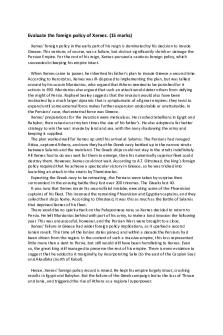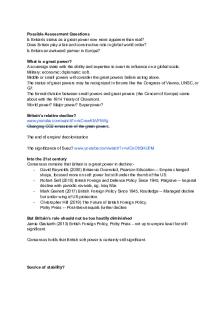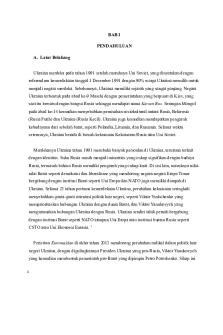Foreign Policy notes PDF

| Title | Foreign Policy notes |
|---|---|
| Author | Brenda Kerr |
| Course | Theory And Analysis Of International Relations |
| Institution | Sonoma State University |
| Pages | 4 |
| File Size | 47.9 KB |
| File Type | |
| Total Downloads | 92 |
| Total Views | 141 |
Summary
Prof McNamara...
Description
Pols 304 9/17 What is Foreign Policy? Foreign Policy: articulation of national interests and the means chosen to secure those interests Material interests: tangible; may be trade agreements, energy sources, control over strategic territory Ideational interests: intangible Role of the State The state o It is the most important actor in the modern international system o The concept of state is central to all relationships in global politics Foreign policy: the process by which states interact State system An order of sovereign, territorial stated developed in Europe from 1648 (Westphalian system) o This order extended beyond Europe until the whole world was organized as a series of nation-states o IR were between nation-states o Rise of nationalism (late 18th century) Globalization may undermine this political order o Eroding sovereign territorial power o Creating competing ideas Nationalism Ideology Politics Sentiment Provides the focus of political identity and loyalty Ethno-nationalism: loyalty and identity shift from state to an ethnic community; desire to create own state Nationalism and foreign policy Perception of role as a special nation with values and traditions that other states should emulate; American exceptionalism Every state has a vision about how the world should be ordered Evolution of nation-states: role of nationalism Pre-modern states o Individuals are more loyal to subnational, religious or ethnic communities o Often called failed or failing states o Central government lacks capacity to provide basic services
o Minimal or nonexistent foreign policies o Examples: Somalia, Syria, Libya, Afghanistan Modern states o Traditional nation-states with control over their territory o Have the ability to protect their citizens and provide services that allow for the accumulation of wealth o Foreign policy goals: economic interests, strive to be major regional power, want to be treated as global equal o Citizens tend to identify strongly with the state and nationalism o Examples: China, India, Russia Postmodern states o Primary liberal Western world o States linked with other states in both formal and informal arrangements and both the regional and global levels o Citizens are less nationalistic and more cosmopolitan in their domestic and foreign policy outlook o Sovereignty is shared with other public and private actors (civil society, gov’t institutions) o Tend to support calls for global governance and efforts to resolve global problems
Factors shaping national interests Individuals, especially political leaders or elites Interest groups Geographic groups International events (neo-realism) Political culture: traditions, norms, values National interest priorities National security that includes the defense of borders and the prevention of external influence over domestic affairs Pursuit of economic interest Defense of a nation’s values Implicit and explicit effort to spread and advocate for peace General foreign policy objectives Power Prosperity Principles Peace Tools to implement objectives o Military o Foreign aid o Diplomacy
Power
Realism school most influential National security Military/defense policy (hard power) Prussian Karl von Clausewitz: war “the continuation of politics by another means” Role of alliances (NATO) Carrots (diplomacy) vs. sticks (military) Coercive diplomacy Role of foreign assistance Role of soft power (Nye)
Prosperity Economic interests primary Imports/exports General long term economic relations with key players central to policymaking IPE- interrelationship between political and economic factors Conflicting views on US economic FP: benign and critical Current debate in US among economic nationalists o Role of illiberalism Principles Democratic idealism o Role of human rights US exceptionalism Manifest destiny: feeling of a historic mission Role in Cold War, neo-conservatives British (white man’s burden) Principles under Trump? Peace Liberal internationalists (Woodrow Wilson) International institutions o League of nations o United Nations Peace through multilateralism vs. unilateralism Peace through power? Realist Perspective on Foreign Policy Classical realists: states are unitary, rational, coherent actors “Rational” means selecting a policy path that maximizes benefits for the sate and minimized risks Primary national interest is national security No place for ideational or ethical concerns when shaping foreign policy Military and economic power are the dominant tools for many realists
Liberal perspective Force is not the only foreign policy tool for leaders Ethical concerns do matter Maintaining rule of law in the international system is important States should create international institutions and regimes that promote global governance Above all, cooperation among states; interdependence Constructivist perspective State and foreign policy goals are defined in the context of collective norms, social identities and understandings about what is going on Ideas and discourse used to shape foreign policy behavior This normative context changes over time o This explains shifts in foreign policy behavior and interests promoted by national leaders o Examples: Cold War, current US-Russia-China relations Marxist perspective Foreign policy is generally controlled by the economic and political elites who also control power at home National interests are determined by the wealthy and powerful Wars are fought primarily for economic reasons The goal of development assistance programs to make poor countries dependents on the donor state Keep developing regions of the world in the position of providing cheap labor, cheap resources, and a welcome place for foreign investors...
Similar Free PDFs

Foreign Policy notes
- 4 Pages

Xerxes\' foreign policy - answer
- 1 Pages

Synopsis Indian Foreign Policy
- 21 Pages

02. Qatar’s foreign policy
- 15 Pages

Foreign Policy in Latin America
- 11 Pages

Pakistan Foreign Policy 1947 to 2004
- 30 Pages
Popular Institutions
- Tinajero National High School - Annex
- Politeknik Caltex Riau
- Yokohama City University
- SGT University
- University of Al-Qadisiyah
- Divine Word College of Vigan
- Techniek College Rotterdam
- Universidade de Santiago
- Universiti Teknologi MARA Cawangan Johor Kampus Pasir Gudang
- Poltekkes Kemenkes Yogyakarta
- Baguio City National High School
- Colegio san marcos
- preparatoria uno
- Centro de Bachillerato Tecnológico Industrial y de Servicios No. 107
- Dalian Maritime University
- Quang Trung Secondary School
- Colegio Tecnológico en Informática
- Corporación Regional de Educación Superior
- Grupo CEDVA
- Dar Al Uloom University
- Centro de Estudios Preuniversitarios de la Universidad Nacional de Ingeniería
- 上智大学
- Aakash International School, Nuna Majara
- San Felipe Neri Catholic School
- Kang Chiao International School - New Taipei City
- Misamis Occidental National High School
- Institución Educativa Escuela Normal Juan Ladrilleros
- Kolehiyo ng Pantukan
- Batanes State College
- Instituto Continental
- Sekolah Menengah Kejuruan Kesehatan Kaltara (Tarakan)
- Colegio de La Inmaculada Concepcion - Cebu









